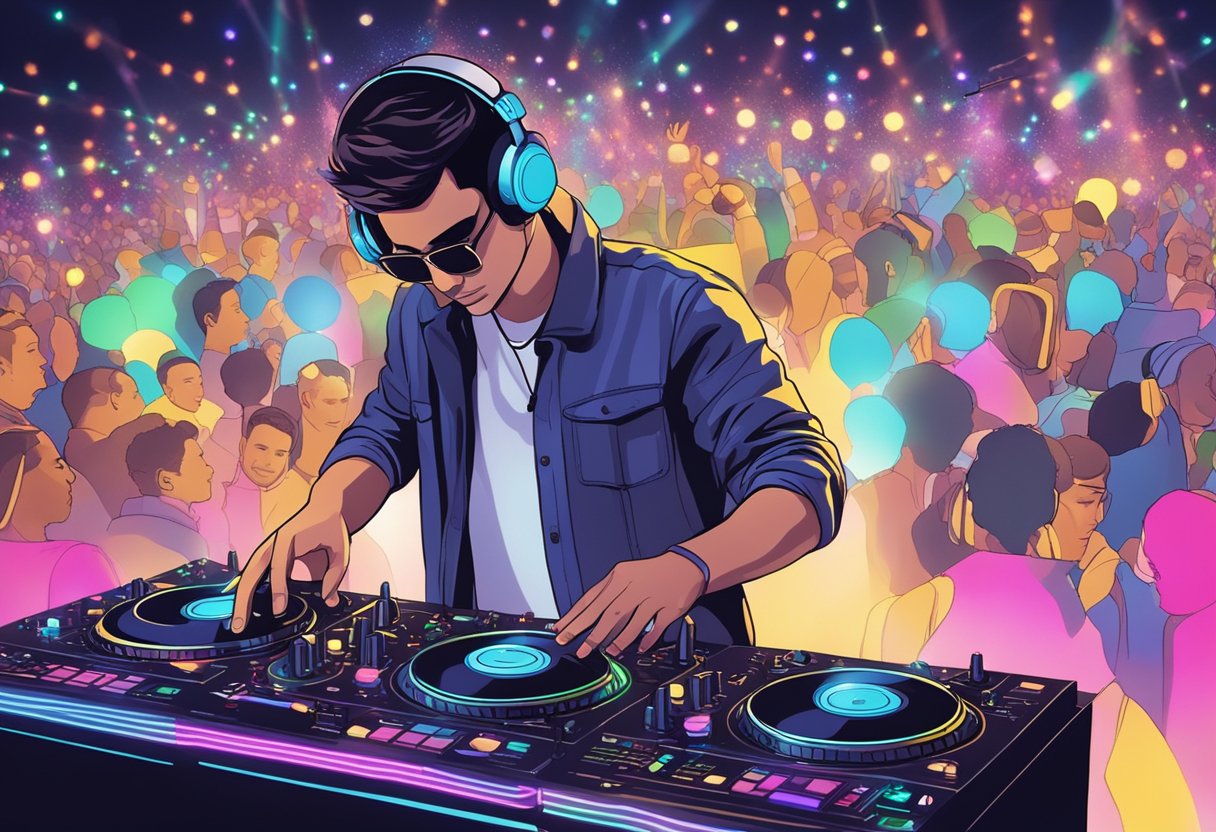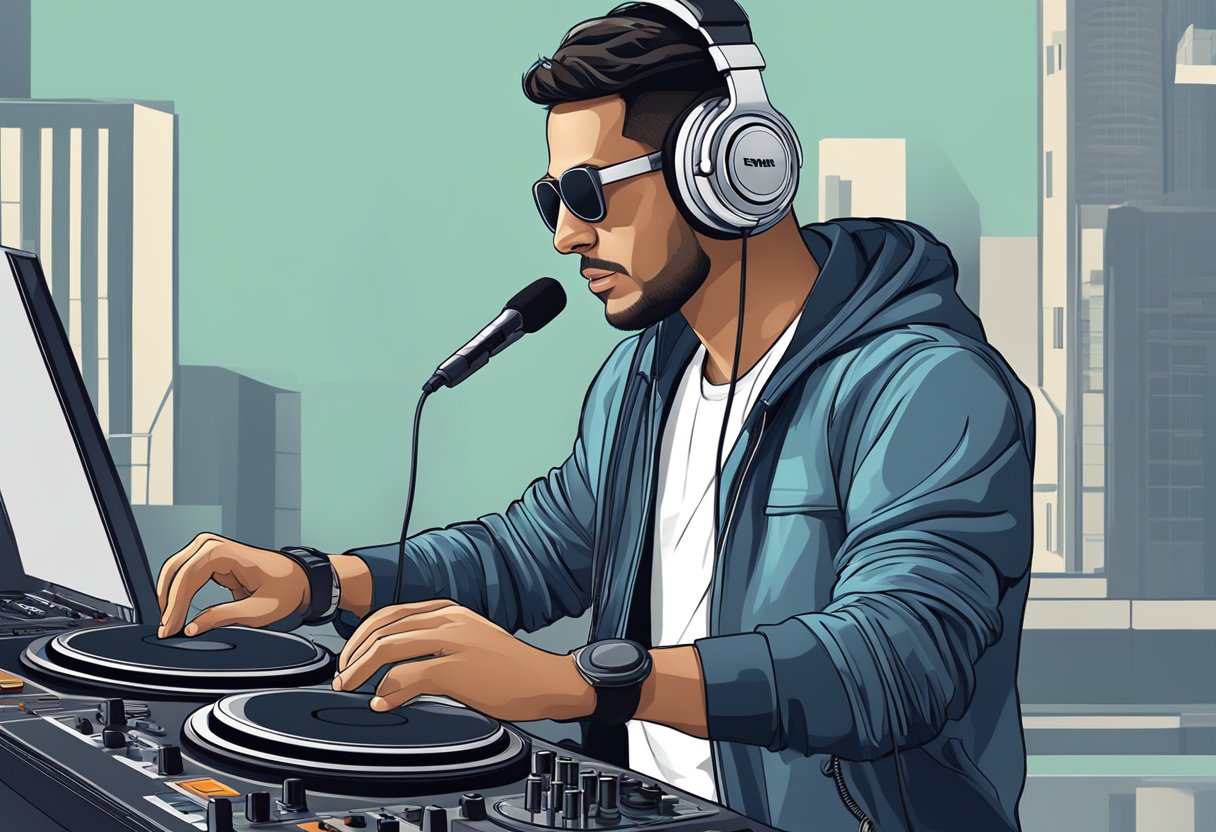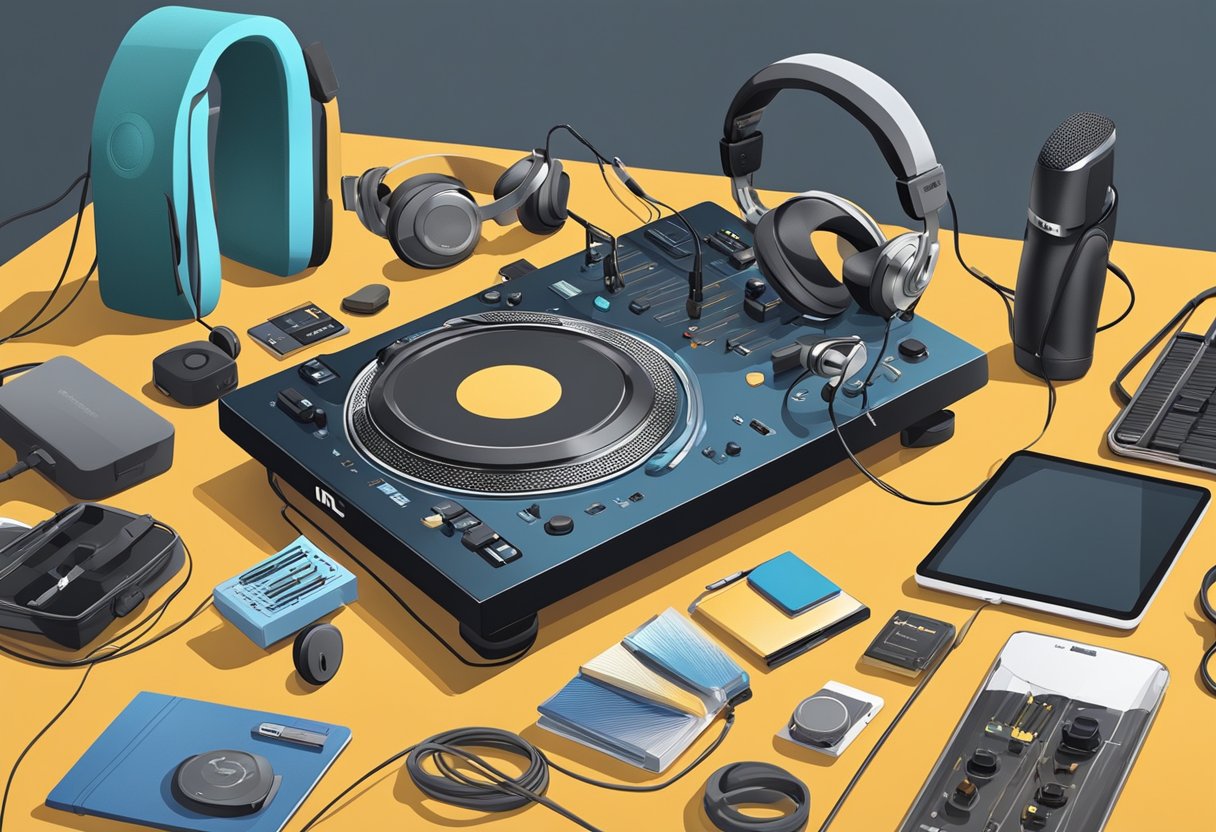When observing a DJ performing, you might notice they often wear headphones, even when the music is blasting through the club’s speakers. This is because, in the world of DJing, headphones are more than just an accessory; they’re an essential tool. I use my headphones to listen to the next track I plan to play. This allows me to prepare the song, ensuring a seamless transition by matching beats, tempos, and rhythms. Listening in advance through my headphones, I can judge how well the next song will connect with the current atmosphere and the audience’s vibe.

Moreover, I also focus on the technical aspects that only headphones can accurately communicate – the intricacies in the audio, the bass and treble levels, and other nuances that wouldn’t be discernible over the loudspeakers. By wearing headphones, I can listen to one track in my ear while the other plays out loud, allowing for fine adjustments to make sure the audience experiences a smooth, danceable mix. It’s a balance of prepping for what’s next while maintaining the current energy on the dance floor. DJ headphones must be able to deliver clear, precise sound and provide comfort for long sets, reinforcing their role as a critical tool in my musical arsenal.
Key Takeaways
- Headphones enable DJs to prepare and cue the next track in advance.
- They provide a clear audio reference for beat-matching and transition.
- DJ headphones must offer quality sound, comfort, and durability.
Fundamentals of DJ Headphones

In my experience, the essence of DJ headphones lies in their ability to provide superior sound isolation and audio quality while ensuring durability for extensive use.
Understanding Sound Isolation and Quality
Sound isolation is crucial for DJs, as it allows me to concentrate on the track that I’m cueing without being disturbed by the club’s noise. A pair of headphones with excellent noise isolation, typically facilitated by a closed-back design, enables me to focus on the finer details of the music, ensuring a seamless mix. Audio quality ties directly into this, as the clarity of the sound within my headphones needs to be impeccable to make precise adjustments, especially in a loud environment.
- Sound Isolation: Effectively blocks external noise
- Closed-Back Design: Aids in sound containment and isolation
- Audio Quality: Ensures clear and uncoloured sound reproduction
Importance of Durability and Build Quality
When I choose DJ headphones, durability and build quality are paramount. I often find myself in high-pressure situations where my equipment is prone to wear and tear. Therefore, headphones crafted with robust materials and solid construction offer peace of mind during live performances. The material used, whether it be high-grade plastics, metals, or memory foam, contributes to both the comfort and longevity of the headphones – critical factors for those long nights behind the decks.
- Durability: Withstands constant handling and movement
- Build Quality: Determines the lifespan and reliability
- Material: Impacts overall feel and endurance
By focusing on sound isolation and audio quality, along with the durability and build quality of the headphones, I ensure that my performances are not only technically sound but also comfortable throughout the event’s duration.
Key Features of DJ Headphones

When I’m selecting DJ headphones, I prioritize features that enhance cueing, ensure durability during performances, and offer versatile connectivity options.
Cueing and Mix Monitoring
Cueing is the cornerstone of a DJ’s headphone usage, allowing me to listen to a track before it goes live to the audience. My headphones must isolate the cued track effectively for mix monitoring and beatmatching. This precise control often relies on headphones with a dedicated cue function and the ability to crossfade between the current track and the next.
- Cueing: Isolating a single track to synchronize beats before a transition.
- Mix: The live audio that the audience hears.
- Crossfade: Moving audio smoothly from one channel to another.
Design Characteristics for Performance
Robust ear pads and adjustable designs cater to long sessions where I might be wearing them for hours. Comfort and noise isolation are crucial—over-ear headphones with a closed-back design generally offer both. A good pair will have swiveling ear cups, allowing me to monitor with one ear while keeping the other on the live mix. Durability is enhanced by a strong driver encased in a sturdy frame, ensuring that they withstand the wear and tear of performances.
- Ear Pads: Cushioned parts that cover the ears for comfort and sound isolation.
- Driver: The component that converts electrical signals into sound.
Connectivity and Compatibility
Connectivity is a critical feature. I typically opt for wired headphones with a coiled cable or a straight cable. A coiled cable offers flexibility and reduces the risk of tangling, which is essential in the confined space of a DJ booth. While there are wireless headphones and options for Bluetooth connectivity, they can introduce latency, which is not ideal when beatmatching. A reliable cord with a secure connection is non-negotiable for me to ensure uninterrupted sound.
- Coiled Cable: Offers more reach and flexibility, reducing tangling.
- Straight Cable: A simpler design that can be easier to manage and replace.
- Bluetooth/Wireless Headphones: Provide mobility but can introduce latency.
- Wired Headphones: Offer the most stable connection for zero-latency cueing and mixing.
Top DJ Headphone Models and Accessories

In my experience, DJs rely heavily on their headphones for accurate sound monitoring. High-quality headphones and essential accessories can make a significant difference in a live performance.
Industry Standard DJ Headphones
Sennheiser HD 25
: Known for their robust build and clear sound reproduction, the Sennheiser HD 25 headphones are a staple in the DJ community. These are on-ear headphones that deliver impressive noise isolation, crucial for loud club environments.
Pioneer DJ
: When it comes to over-ear options, Pioneer DJ models, especially the Pioneer DJ HDJ-X10, offer exceptional durability and high-resolution audio. These headphones are designed with DJs in mind, providing comfort during long sets and precise sound quality.
AIAIAI TMA-2
: The AIAIAI TMA-2 DJ headphones stand out with their modular design, allowing for a high degree of customization. With this model, I can easily switch out parts and tailor the headphones to my exact preferences.
Audio-Technica ATH-M50x
: Another favorite of mine is the Audio-Technica ATH-M50x. These studio monitor headphones have gained popularity among DJs for their excellent sound clarity, deep bass, and foldable design for easy storage.
Essential Accessories for DJs
Earplugs
: Earplugs are an essential accessory for any DJ. Protecting my hearing from the constant exposure to loud music is crucial. I recommend high-fidelity earplugs that attenuate sound evenly, allowing me to hear the mix accurately while safeguarding my ears.
Carry Cases
: A sturdy carry case is also essential for protecting headphones. Many brands, like V-MODA and Audio-Technica, offer cases that are tailored to fit their headphone models.
Replacement Ear Pads
: Over time, headphone ear pads can wear out, so having replacement ear pads on hand ensures my headphones remain comfortable and maintain sound quality. Models like the V-MODA Crossfade 3 and Audio-Technica ATH-M50x often have readily available replacements.
Cables and Adapters
: Spare cables and adapters are a must in my DJ bag. Detachable cables, such as those on the ATH-M50x, mean I can easily replace them if they get damaged, and having adapters ensures I can connect to a variety of audio equipment.
Practical Aspects of Using DJ Headphones
In my experience, using DJ headphones is a game-changer for performance and health, especially when understanding the intricacies of club and studio settings and health and safety considerations.
Club and Studio Settings
In a club environment, the volume is typically high, and being able to isolate the next track on my headphones is crucial. I rely heavily on the cue button of my DJ mixer or DJ controller to select the track I want to pre-listen without affecting the live set. The gain and volume control features are essential for me to adjust the levels between the current track and the one I’m cueing. This way, the transition is smooth, and the dancing crowd never notices the switch.
When I’m in the studio, I use headphones with a flat frequency response, allowing me to accurately mix and master tracks. The low impedance and high reliability of studio-grade headphones make them an ideal choice for long mixing sessions. For both settings, portability is also important as I often move between gigs and sessions.
Health and Safety Considerations
Long hours in the studio or performing at clubs can put my hearing at risk. I’m very cautious about hearing loss, so I choose headphones with excellent padding and sound isolation to keep the volume at a safe level. It’s also critical to have headphones that can handle the high output without distortion as this helps prevent me from increasing the volume excessively.
Additionally, monitoring the battery life is a non-issue for me since I prefer wired headphones in a professional setting to avoid any latency or connectivity issues. The reliability and volume control also offer me the peace of mind that I can perform without unexpected interruptions.
Frequently Asked Questions
In this section, I address some of the most common curiosities about what DJs are doing with their headphones during performances.
For what reasons do DJs wear headphones on one side during their performances?
DJs often wear headphones on one side to allow them to listen to the next track they are cueing up while still staying in tune with the live mix that the audience is hearing. This technique helps them in timing their transitions accurately.
What types of headphones are commonly preferred and used by professional DJs?
Professional DJs typically prefer headphones that offer excellent sound isolation, durability, and comfort. Models with a strong low-end frequency response are also favored for beatmatching purposes. Certain brands and models reign in DJ communities for their reliable performance.
How do DJs maintain their hearing health; do they use earplugs in loud environments?
DJs often use high-fidelity earplugs that attenuate the volume without distorting sound quality to protect their hearing in loud environments. This preventative measure allows DJs to perform frequently without risking hearing loss.
In what circumstances might a DJ choose to remove their headphones while mixing tracks?
A DJ might remove their headphones during a performance as a matter of personal comfort or when they are confident in their knowledge of how both the current and next tracks sound. This can happen when they’re performing with familiar music or when the booth monitors provide an accurate representation of the main output.
What is the significance of DJs wearing headphones around their neck at times?
Wearing headphones around the neck can be a matter of convenience or style. It ensures headphones are readily accessible for when the DJ needs to preview the next track. Additionally, it can be a form of personal branding or indicating readiness to mix.
How does the choice of using a MacBook affect a DJ’s performance compared to other computers?
Using a MacBook may affect a DJ’s performance due to its compatibility with popular DJ software, reliability, and low-latency audio capabilities. While DJs can perform well with other types of computers, many find that MacBooks offer a seamless performance experience.
